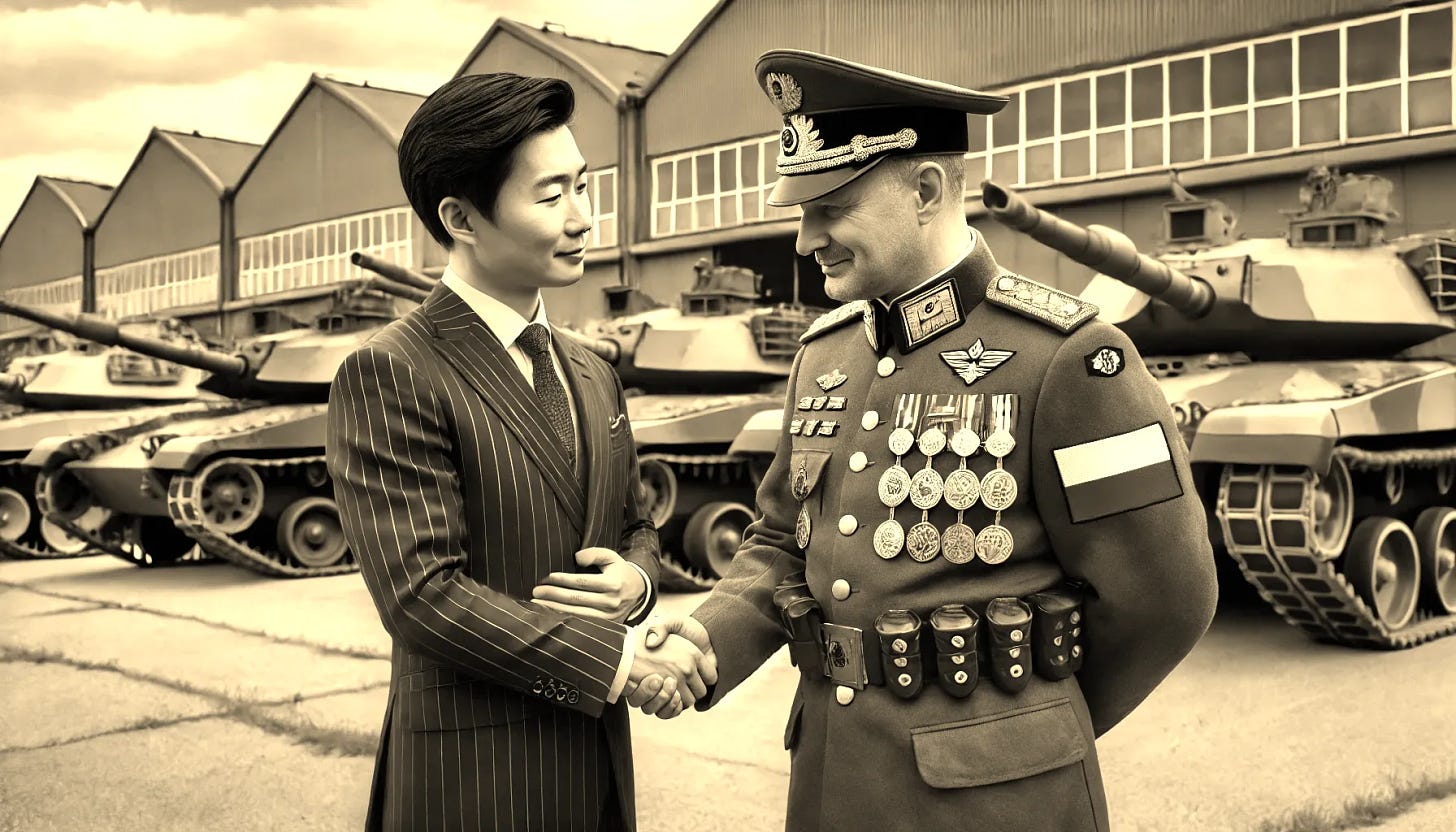South Korea and NATO
Being a NATO partner state sure has its advantages - when you're selling military hardware
South Korea's engagement with NATO is routinely interpreted through the lens of strategic alliances and security interests. Near every mainstream commentator will spruik the line that South Korea’s links with NATO (1) increase democratic solidarity in the face of authoritarian collusion; (2) increase the likelihood that European states would support South Korea in a North Korea contingency; and (3) strengthen the liberal-democratic order and rule of law.
Commentators see what they want to see. South Korea's interaction with NATO is not about strategy. It’s about the arms industry and exports.
South Korea has emerged as a significant player in the global arms market. Once primarily a buyer of defense technology, the country is now one of the world's top arms exporters, capitalizing on its advanced manufacturing capabilities and robust technological innovation. South Korean defense companies like Hyundai Rotem, Hanwha Defense, and Korea Aerospace Industries (KAI) have developed highly competitive products ranging from tanks and artillery to fighter jets and submarines.
This transformation of South Korea's defense industry has been driven by a combination of factors: a desire to reduce dependency on foreign (read U.S.) suppliers, maintain a high level of domestic military readiness, the desire to boost economic competitiveness, and a lot of long-term government planning.
By interacting with NATO, South Korea is tapping into a massive market of allied countries that regularly upgrade their military capabilities, particularly in light of Russia's war in Ukraine. South Korea's arms sales to NATO member states have surged, with Poland, Norway, and Estonia emerging as key customers for tanks, missile systems, and ammunition. Economic motivations and the desire to penetrate the lucrative NATO arms market is at the core of South Korea's outreach.
While South Korea’s participation in NATO meetings or joint exercises might seem like a demonstration of shared security interests, the reality is more commercially driven. NATO, as a collective security organization, often operates under an implicit understanding that members and partner countries will maintain a certain level of interoperability with the alliance’s military standards. This provides South Korea with an opportunity to market its arms as NATO-compatible, which enhances their appeal to NATO members.
One of the most illustrative examples is South Korea's defense contract with Poland, a NATO member, which purchased South Korean K2 Black Panther tanks, K9 howitzers, and FA-50 fighter jets. This deal, valued at billions of dollars, underscores how South Korea’s defense industry sees NATO as a major customer base. The fact that many NATO countries, especially those on the alliance's eastern flank, are looking to rapidly modernize their militaries in response to perceived threats from Russia, plays right into South Korea’s hands. These countries are seeking reliable arms suppliers, and South Korea, with its well-priced, high-quality equipment, is an ideal candidate.
Countries like Poland or Norway are purchasing South Korean arms because of their affordability, effectiveness, and reliability of supply, not because South Korea is a key strategic partner in their defense planning. South Korea is just a reliable supplier. For South Korea, the focus is on maintaining economic competitiveness in the arms industry rather than forging deep strategic ties with NATO.
It would be an exaggeration to claim that strategic interests play absolutely no role in South Korea’s NATO interactions, but they are secondary to commercial concerns.
South Korea’s links to NATO (1) Do not increase democratic solidarity in the face of authoritarian collusion. If South Korea were interested in increasing democratic solidarity, it would be donating arms to Ukraine, rather than selling to those who donate. (2) Do not increase the likelihood that European states would support South Korea in a North Korea contingency. The sole determinant of that is U.S. diplomatic pressure and even then, only a limited number of specific states would be able to contribute more than token support. Lastly, South Korea’s links to NATO (3) do not strengthen the liberal-democratic order and rule of law. If South Korea really wanted to do this, the commitment would be bipartisan and deeper than a single aberrant administration. There would be a continuous and even public concern regarding issues like nuclear non-proliferation, terrorism, international crime, and multilateral trade liberalism.
South Korea’s growing interaction with NATO is best understood through the prism of its commercial arms industry. As South Korea continues to solidify its position as a major arms supplier to NATO countries, its motivations are far more economic than strategic.




